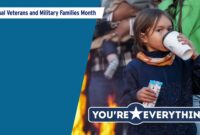Military Travel Website: Navigating the complexities of military travel can be challenging, but a well-designed website can simplify the process significantly. This platform aims to streamline the experience for active duty personnel, veterans, and their families, providing a centralized resource for planning and booking trips, accessing essential information, and leveraging exclusive military discounts. We explore the key aspects of creating a user-friendly and informative website dedicated to meeting the unique needs of the military community.
From meticulously crafted user personas to robust security measures, this website will address the specific travel requirements of different military groups. The integration of advanced booking systems and a comprehensive content strategy will ensure a seamless user experience, making travel planning efficient and stress-free. We will also explore marketing strategies to reach the target audience effectively and highlight the website’s accessibility features to ensure inclusivity for all users.
Target Audience Analysis
Understanding the diverse needs of our military community is paramount to building a truly effective travel website. This analysis identifies key user groups, their specific travel requirements, and representative personas to guide website development and content strategy. The goal is to create a platform that caters to the unique circumstances and preferences of each segment.
Primary User Groups and Their Travel Needs
This section details the primary user groups utilizing military travel services and their individual travel needs and preferences. Each group faces distinct challenges and opportunities when planning and executing trips.
Active duty personnel often have limited notice for travel, requiring flexible booking options and potentially need to accommodate deployment schedules. Their travel needs frequently involve short-notice trips, often for training or temporary duty assignments (TDY). Budget constraints, imposed by per diem allowances, also play a significant role in their choices. Furthermore, access to secure and reliable transportation and accommodation is crucial, particularly in potentially high-risk locations.
Veterans, on the other hand, often prioritize leisure travel, seeking relaxation and opportunities to reconnect with family and friends. Their travel patterns are typically less constrained by deployment schedules but may be influenced by factors such as disability accommodations, proximity to medical facilities, and the availability of veteran-specific discounts. Budget considerations remain important, but the emphasis might shift towards value for money and memorable experiences.
Military families face unique challenges, including frequent relocations, deployments that separate family members, and the need to coordinate travel around school schedules and other family commitments. Their travel needs encompass a broader spectrum, from short-term trips to visit deployed family members to longer vacations designed to strengthen family bonds. They often require family-friendly accommodations, child-care options, and travel insurance that caters to their unique circumstances.
User Personas
To further refine our understanding, we’ve developed user personas representing each group. These personas illustrate typical characteristics, travel habits, and technological proficiency.
Active Duty Personnel: Sergeant John Smith – Age 32, currently stationed in Fort Bragg, NC. Highly proficient with technology, frequently uses mobile apps for booking and communication. Travels frequently for TDY, often on short notice. Prioritizes cost-effectiveness and secure accommodations. Limited vacation time necessitates efficient booking processes and streamlined travel planning. He values quick access to information regarding travel regulations and allowances.
Veteran: Captain Sarah Jones – Age 45, recently retired after 20 years of service. Moderately proficient with technology, prefers using a desktop computer for travel planning. Travels for leisure, often with her family. Prioritizes comfortable and accessible accommodations, potentially needing disability-related assistance. Values opportunities for veteran discounts and access to veteran-friendly travel resources. She prioritizes reliable and trustworthy information.
Military Family: The Miller Family – Includes a Lieutenant Colonel (father), a teacher (mother), and two school-aged children. Moderately proficient with technology, often uses a combination of desktop and mobile devices for travel planning. Travel needs are diverse, ranging from visiting family members to longer family vacations. Prioritizes family-friendly accommodations, child-care options, and flexible cancellation policies. They value clear and concise information about travel insurance and family-oriented activities.
Final Summary
Ultimately, a successful military travel website requires a holistic approach, balancing functionality, user experience, security, and marketing. By carefully considering the needs of the diverse military community and leveraging technology effectively, this platform can become an indispensable resource, simplifying travel planning and enriching the experiences of those who serve.




